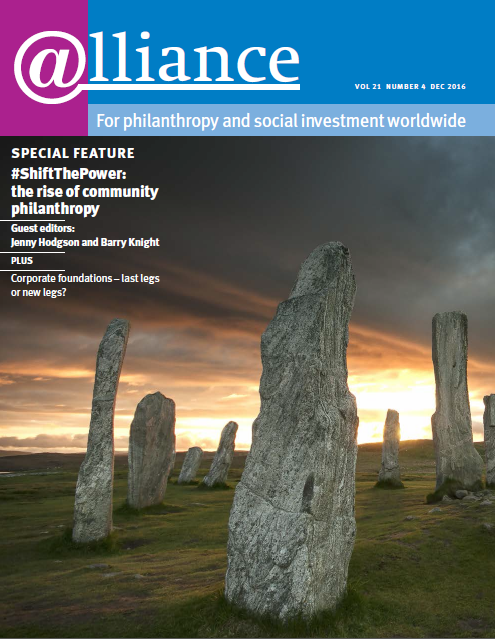In today’s super-connected society, major decisions are being made based on little credible information and even less meaningful relationships. Communication seems to be restricted to 140 characters or less. In turn, conflict and disagreements appear even more prevalent as private opinions are broadcast across social media. In these conditions, community philanthropy organizations are increasingly significant.
The wide array of organizations that make up this sector can serve as a meaningful connector for people to engage in their communities and make a difference – either by giving or by allowing a potential funder to see problems and solutions through the eyes of those they are trying to help.
While the Mott Foundation has steadfastly supported community philanthropy for more than 30 years, we’re getting a first-hand look at its importance in our own backyard as we grapple with the water crisis in Flint, Michigan. When high levels of lead were discovered in the city’s improperly treated drinking water and, as a result, turned up in the blood of many Flint children, it created the type of public health emergency that many of us had never encountered before.

Ridgway White and a young student celebrate the opening of an early education centre in Flint, Michigan.
The Community Foundation of Greater Flint (CFGF) was among the first to rise to the challenge of leading the non-profit community’s on-the-ground response. Along with stewarding several funds for individual donors, CFGF established the Flint Child Health and Development Fund to help ensure the charitable funds that have poured into the city are responsibly directed to addressing both the immediate and longer-term needs of the city’s most vulnerable residents.
The fund, for which the Mott Foundation will match donations up to $5 million through to the end of 2016, will support health, education and other social services for affected residents. What’s more, grant decisions are made by an advisory committee of Flint residents. This illustrates community philanthropy at its best – empowering local residents to play a role in community decision-making that creates lasting solutions to tough challenges.
The need for local people to come together to tackle big challenges constantly arises in communities all over the world, which is why community philanthropy can be such a powerful tool in creating positive change on a global scale. While the issues vary and institutional models may look different in different places, the idea of people-led giving and development is universal. In a sense, community philanthropy is the great equalizer of the charitable sector – everyone can have a seat at the table.
Mott’s support for community philanthropy has contributed to the spread of community foundations from about 800 in 1980 to more than 1,800 around the world today. Our focus going forward will not only be on growing the field, but on helping it mature in ways that will allow it to address many of today’s global challenges through each community’s experiences. Helping to build awareness and understanding, both inside and outside community philanthropy, will be key to garnering more support for the field and bringing it centre-stage.
While the issues vary and institutional models may look different in different places, the idea of people-led giving and development is universal.
While money and donors are important to solving the problems we seek to address, contributions come in many forms. Sharing our experiences and learning what works in communities around the world are also vital. From smaller, focused efforts like giving circles, to online platforms like GlobalGiving that make it possible for non-profits everywhere to access the tools and training they need to be more effective, Mott supports efforts that provide the space for meaningful exchange and connection.
A couple of years ago, we all proudly celebrated the 100th anniversary of community foundations as an idea that has stood the test of time. I’m looking forward to seeing how community philanthropy will help the world better face the challenges of the next century.
Ridgway White is president of the Charles Stewart Mott Foundation. Email info@mott.org







Comments (0)